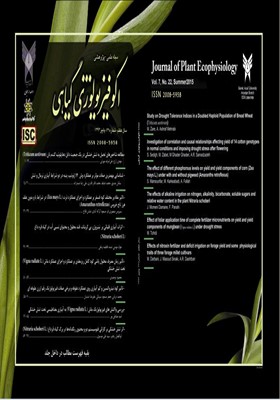Effects of sulfur, vermicompost + Thiobacilus bacteria on some chemical properties of calcareous soil and phosphorus use efficiency of black seed
Subject Areas : Journal of Plant EcophysiologyS.M. Seiedi 1 * , P. Rezvani Moghadam 2 , M. Khaje Hosseini 3 , حمید شاهنده 4
1 - گروه زراعت و اصلاح نباتات، دانشگاه فردوسی مشهد
2 - گروه زراعت و اصلاح نباتات، دانشگاه فردوسی مشهد
3 - گروه زراعت و اصلاح نباتات، دانشگاه فردوسی مشهد
4 - دانشگاه تگزاس، آمریکا
Keywords: Electrical conductivity, Phosphorus uptake efficiency, Soil pH, Sulfur oxidation,
Abstract :
In order to investigate the effects of increasing soluble phosphorus on seed production and phosphorus use efficiency of black seed (Nigella sativa L.) in a calcareous soil, a greenhouse experiment with three replications was conducted at Faculty of Agriculture, Ferdowsi University of Mashhad, Iran, in 2013. A complete randomized design was used based on factorial arrangement. The fertilizer resources (control, vermi compost, sulfur, vermicompost + sulfur, vermicompost + Thiobacilus bacteria, sulfur + Thiobacilus bacteria and vermicompost + sulfur + Thiobacilus bacteria) and three levels of phosphorus (0, 30 and 60 kg.ha-1) were the first and second experimental factors, respectively. Sulfur + Thiobacilus bacteria and vermicompost + sulfur + Thiobacilus bacteria significantly decreased soil pH (by 0.85 and 0.80) and increased EC and available phosphorus of soil (more than 2.5 times), respectively. in condition of no phosphorus application, sulfur or sulfur + Thiobacilus bacteria had significantly effects on increasing the soil available phosphorus. Vermicompost + sulfur + Thiobacilus bacteria had the highest total plant dry weight and seed weight per plant. However, the lowest phosphorus uptake efficiency (15.31%) was observed in control treatment. In a calcareous soil, sulfur application individually or in combination with vermicompost treatment can be suitable approach in decreasing the problems caused by applying of chemical phosphorus fertilizers.

